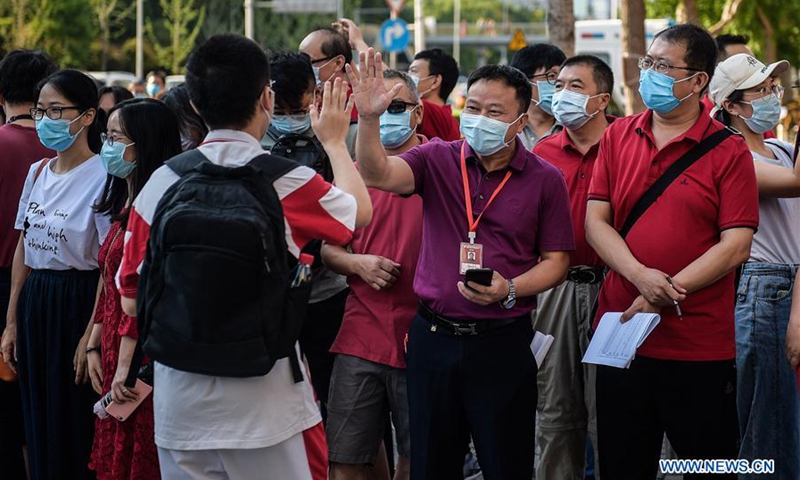
A teacher encourages an examinee outside an exam site in Beijing, capital of China, July 7, 2020. The 2020 national college entrance exam began on Tuesday.(Photo: Xinhua)
China has established the world's largest higher education system with 240 million people having received higher education, the country's Ministry of Education (MOE) announced on a press conference on Tuesday.
The ministry introduced the achievements of China's higher education reform and development since the 18th Communist Party of China (CPC) National Congress in 2012 at a press conference on Tuesday, noting that the total number of students in higher education at present is more than 44.3 million.
The enrollment rate to higher education increased from 30 percent in 2012 to 57.8 percent in 2021, an increase of 27.8 percentage points, which is a historic leap that marks higher education in China has entered the popularization stage recognized by the world, the ministry said.
A number of Chinese universities and a large number of disciplines have reached a very advanced level in the world.
The number of people who have received college education in China has reached 240 million, and the average length of education of the newly added labor force has reached 13.8 years. Higher education has provided a stepping stone for building the world's major talent center and innovation hub.
For ten years, more than 10,000 outstanding students have chosen basic disciplines, paving the way for independent talents and for the establishment of a solid foundation for building the world's most important source of talents and innovation hub.
Since the 18th CPC National Congress, a total of 265 new majors have been included in the undergraduate program catalog. As a result, 17,000 new undergraduate programs were added, and talent training became more adaptable to new technologies, industries and forms of business.
"The Ministry of Education, relevant ministries and commissions, large enterprises and local governments have jointly built 151 new colleges and universities. Provincial and ministerial co-construction of local universities received a total of more than 100 billion yuan in funding during the 13th Five-Year Plan period, effectively improving the overall level of university construction and the ability to serve national and regional major strategic capabilities, according to the press conference.
Also, innovation and entrepreneurship education in China leads the world. Colleges and universities across the country have opened more than 30,000 specialized courses and 11,000 open online courses on innovation and entrepreneurship education, and hired 174,000 talents as full-time and part-time teachers on innovation and entrepreneurship.
China also has held seven times annual international college students' innovation contests, attracting 6.03 million teams, or 25.33 million college students from more than 120 countries and regions on five continents. The contests have directly created 750,000 jobs and indirectly provided 5.16 million jobs, promoting talent cultivation at the same time.
The capacity of colleges and universities to serve major national strategies has continued to increase, and they have won more than 60 percent of the national science and technology awards. The colleges also have undertaken more than 60 percent of the national basic research and more than 80 percent of the national natural science foundation projects.
Colleges and universities provide key technology for high-speed railway, nuclear power, biological breeding, vaccine development, national defense and other key areas, and actively participate in the development of super computers, the BeiDou satellite navigation system and the Shenzhou spacecraft series.
Global Times


